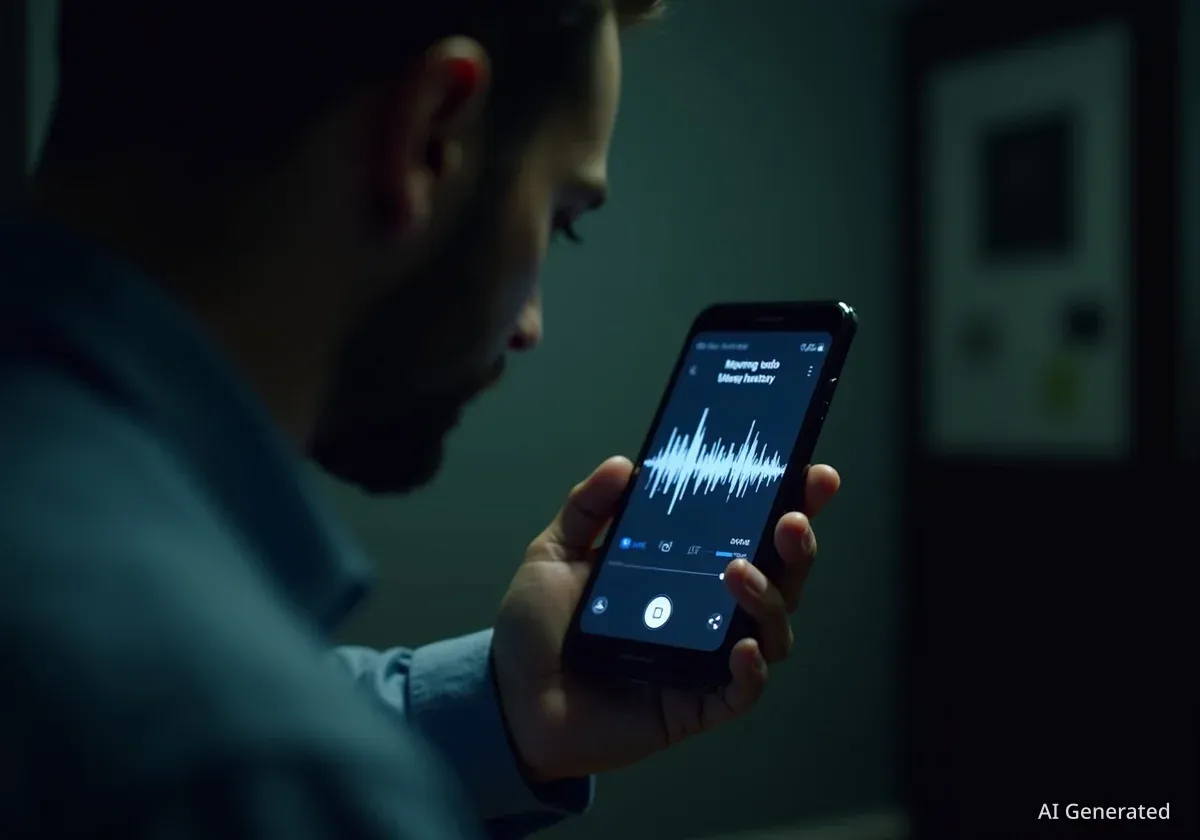A recent study has found that people can no longer reliably differentiate between a real human voice and an AI-generated voice clone. Research published in the journal PLoS One indicates that listeners are just as likely to believe a sophisticated AI voice clone, or "deepfake," is human as they are an actual person's voice.
This development highlights the rapid advancement of artificial intelligence in speech synthesis and raises significant questions about security, ethics, and the potential for misuse. The technology to create these convincing clones is now widely accessible and requires minimal technical skill.
Key Takeaways
- A study in PLoS One showed listeners misidentified 58% of AI-cloned voices as human.
- There was no statistical difference in the believability of real voices and their AI clones.
- The voice clones were created using commercially available software and only four minutes of audio data.
- The findings present major security risks for voice authentication and increase the potential for sophisticated scams and misinformation campaigns.
Study Finds Listeners Unable to Distinguish Voices
Researchers presented study participants with a series of voice recordings to test their ability to identify AI-generated speech. The experiment included 80 different voice samples, with 40 from real human speakers and 40 created by artificial intelligence.
The study, led by Dr. Nadine Lavan, a senior lecturer in psychology at Queen Mary University of London, aimed to understand how convincing modern AI speech technology has become. The results demonstrated a clear distinction between different types of AI voices.
Generic AI vs. Deepfake Clones
The study made a crucial distinction between two forms of AI-generated speech. The first type, generic voices created from scratch, is similar to what people experience with digital assistants like Siri or Alexa. Listeners were still largely able to identify these voices as artificial, misclassifying them as human only 41% of the time.
However, the second type, known as voice clones or deepfake audio, produced strikingly different results. These voices are trained on audio recordings of a specific person. When participants listened to these clones, they misidentified them as human in 58% of cases. This rate was statistically similar to the 62% accuracy rate for correctly identifying genuine human voices.
By the Numbers
According to the study, participants correctly identified real human voices only 62% of the time, while misidentifying advanced AI clones as human 58% of the time. This narrow margin suggests the line between real and fake has effectively vanished for the average listener.
The Growing Threat of Voice Cloning
The implications of this technology are significant, particularly in the areas of security and criminal activity. Dr. Lavan noted the potential for these realistic voice clones to bypass security systems that rely on voice authentication for access to bank accounts or other sensitive information.
What is Deepfake Audio?
Deepfake audio is a form of synthetic media where a person's voice is replicated using artificial intelligence. By training a machine learning model on recordings of a person's speech, the AI can generate new sentences that sound exactly like that individual, even saying things they never actually said.
There have already been several documented cases of this technology being used for malicious purposes. In one incident, a woman named Sharon Brightwell was deceived into sending $15,000 to scammers who used an AI-generated clone of her daughter's voice in a fake emergency call.
Brightwell described the voice as completely convincing, stating, "There is nobody that could convince me that it wasn’t her."
Misinformation and Political Disruption
Beyond financial scams, realistic voice clones can be used to create fake audio of public figures, such as politicians or celebrities. Such fabrications could be used to spread misinformation, discredit individuals, or incite social unrest. Recently, con artists created an AI clone of Queensland Premier Steven Miles's voice to promote a fraudulent Bitcoin investment scheme.
"AI-generated voices are all around us now... it was only a matter of time until AI technology began to produce naturalistic, human-sounding speech."
Technology is Accessible and Inexpensive
One of the most concerning aspects highlighted by the researchers is the accessibility of the technology. The voice clones used in the study were not created with highly specialized or expensive equipment. Instead, the team used commercially available software.
The process required very little training data. According to the study, as little as four minutes of recorded human speech was sufficient to train the AI to create a believable clone. This low barrier to entry means that creating a convincing deepfake voice is now within reach for almost anyone.
Dr. Lavan emphasized this point in a statement, explaining, "The process required minimal expertise, only a few minutes of voice recordings, and almost no money. It just shows how accessible and sophisticated AI voice technology has become."
Potential for Positive Applications
While the risks are substantial, the researchers also acknowledge that advanced voice synthesis technology has positive potential. The ability to create high-quality, customized synthetic voices could lead to significant benefits in various fields.
Potential positive applications include:
- Accessibility: Creating personalized communication aids for individuals with speech impairments.
- Education: Developing more engaging and interactive learning tools.
- Entertainment: Providing new creative avenues for voice actors and content creators.
Dr. Lavan suggested that "bespoke high-quality synthetic voices can enhance user experience" in many areas. However, the rapid development and accessibility of the technology underscore the urgent need for ethical guidelines and security measures to mitigate the clear and present dangers it poses.





